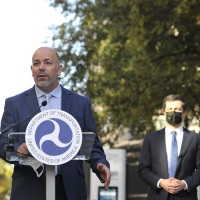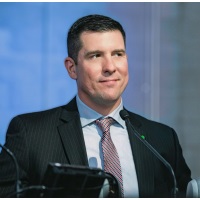
SEPTEMBER 24-25 | AUSTIN, TEXAS

Fleet & Commercial Vehicles
The latest in electrification, fuel trucks, dynamic routing, autonomous tech, fleet management and more – your one top shop to a more efficient and sustainable fleet.
MEET THE SPEAKERS FROM OUR Fleet & Commercial Vehicles STAGE
Brice Adamson, President, Enterprise Fleet Management
Alexia Bednarz, Head of Sustainability, Nikola

Evan Dacey, Head Fleet Asset Manager, City of Vancouver

Jay Hudson, Director, Fleet and Government Sales, Blink Charging

Aravind Kailas, Advanced Technology Policy Director, Volvo Group North America

Suman Kharbanda, Vice President, Advanced Technology & Innovation, FedEx

Ken Marko, Fleet Sustainability Senior Manager, US Foods

Jerrod Mounce, Vice President of Energy and Sustainability, JB Hunt Inc.

Sunzay Passari, Senior Director and Head of Digital Innovation, UPS

Kyle Pynn, Communications Chief, PACT (Powering America's Commercial Transportation)

James Seeber, Brand Technical Specialist, IBM
Robbie Stephens, Lead, Fleet Strategy and Growth, Uber

Philip Ventimiglia, Director RideCare Services, Bosch Mobility


Austin, Texas, 24 - 25 September 2024
Schedule
Create your personal agenda –check the favourite icon
Welcome from Terrapinn
Opening remarks
Autonomous now
Future mobility trends
Next generation charging platform: lessons from scaling from 0 to 200,000 charge points across Europe in three years
How Elysia unlocks EV potential with battery intelligence
EY presentation title TBC
Orientating product teams around a long-term vision and achieving an effective scale and commercialization strategy
Powering up: cross collaboration to improve public EV charging reliability and accessibility
Designing for sustainability at Rivian
Case study: what it takes to launch a gigafactory
Beyond the bus stop: the human connections powering public transit
Impactful urban moves - reshaping mobility in Berlin
Innovation in the circular economy: the recycling of heavy-duty trucks
Infrastructure challenges in urban vehicle electrification
Electrifying the Empire State: opportunities and challenges of realizing New York’s clean transportation future
Derisking the validation of the software defined vehicle
Fast tech and slow boats: building the best of both worlds into battery supply chain
Virtual enforcement in a driverless world
Scaling up micromobility: Bird’s story
Emerging markets: investing in the EV value chain and electrifying public transport
AV regulation and policy insights
The electric school bus: Texas and beyond
The road to an autonomous future
Driving confidence for EV adoption: funding, energy policy & government incentives
EV strategy: funding, partnerships & collaborations
AI in mobility: the most successful applications
Advances & innovations in battery tech: energy density, fast charging and software
Funding transport infrastructure projects: the optimal city-transport-investment
How transport providers and governments are partnering on MaaS programs.
Financing large scale transport infrastructure projects in a sustainable way
Driverless vehicles: how is global regulation developing?
The adoption of EVs in public transportation: implementation & expansion
Barriers to electrification
Barriers to electrification
Advancing EV adoption: the push for open standards and reliable charging infrastructure
Designing interoperable EV charging solutions
Market trends and development: elevated risk and the challenges in structured EV financing
Commercial use cases: delivery, ride hailing & logistics
Innovations in charging infrastructure accessibility
Government policies & incentives
The software-defined vehicle: disrupt or be disrupted
Supply chain and raw materials: sourcing, sustainability, vertical integration & strategic partnerships
Urban planning: smart city initiatives and investment opportunities
Inclusivity & equitability: developing transport systems for all
Using software to extend the in-car customer experience
Regulatory frameworks and technologies for accessibility & inclusion
Smart ticketing and contactless payments: modernizing public transport
Accelerating charging network growth: Voltera’s role in expanding charging infrastructure
Overview: Learn about Voltera’s unique approach to supporting and accelerating the growth of charging networks.
Discuss Voltera’s unique model for supporting charging networks.
Highlight how Voltera lowers costs and speeds up deployments.
Advantages of multi-tenant setups for network operators.
Future plans for scaling operations in partnership with charging networks
From plug to profit: white-label software for reliable and lucrative EV charging networks
Connecting the battery-defined and software-defined vehicle with battery analytics
Facing underground design challenges with clarity
Smart charging & demand response programmes
EV supply chain: localisation & decarbonisation
The rise of the API economy: open data frameworks to empower mobility
Lithium-ion dominance and beyond: where the industry is placing its bets
How EVs & AVs will interact with smart city infrastructure
Key drivers and requirements for MaaS scalability
The evolution of the automotive business model: is car ownership a thing of the past?
Tech advances & development: Breakthroughs in machine learning, computer vision and sensor technology
ESG: achieving decarbonised and sustainable mobility for all
Addressing the last mile challenge: improving connectivity from transit hubs to final destinations
The road forward: advancing infrastructure through innovation
Fleet payments in an EV world: opportunities and obstacles
Electric road system: international standardization activity
The critical material battery initiative
Using data to center health and equity in urban transportation planning
How collaborative models are taking ideas from concept to scale up
The road forward for autonomy: public perception & safety
V2G and grid integration: how utilities are matching demand
The vehicle as a ‘connected hub’: shifting from product to customer experience
Cybersecurity: critical imperatives for the connected future
Recycling batteries for second life applications
Real time data collection & analysis: integrating IoT devices and sensors into urban infrastructure
Data sharing frameworks for effective transport service integration
New insurance models for the mobility revolution
How autonomous vehicles will interact with smart city infrastructure
The policies and programs that are driving vehicle electrification
BRT deployment in Americas urban centres
Smart, sustainable, and connected: the future of electric mobility ecosystems
Veriport eVTOL operations, the business model of AAM
Presentation by tubular.network
Opening remarks
Closed loop supply chains: how the industry is changing
Building resilience across the supply chain
The huge opportunity in thinking differently about cities
Closing remarks and 2025 announcement
Create your personal agenda –check the favourite icon
Opening remarks
How digital wallets are driving the connected car economy
Driving confidence in EV adoption
Test driving the transition to e-mobility
Unlock fleet potential with smart & connected solutions
Practical realities of fleet electrification
Incubation: building the right partnerships to unlock innovation
Last minute and to order: optimising supply chains to reduce delivery journeys
Infrastructure bill in action: advancing intercity and commuter rail
An open-loop payments deployment - The good. The bad. And the ugly.
Market overview: how a dealership franchise is balancing cutting edge tech with profitability
What does the future in-cabin experience look like?
State of the transportation market
Total Mobility - the Role of Advanced Air Mobility (AAM) in providing new transportation options for urban, rural and regional mobility
Connecting the EV ecosystem
Sustainability beyond electrification: what fleets can do to reduce emissions
Robotics and the future of the last mile
Connecting the dots to create better communities
Making micromobility and micro-cargo work for the city
Electric sells! Undoing the damage of the politicization of EVs
Case study: How Altamonte Springs' culture of innovation led to the 1st multiphase, multi-year city government autonomous deployment in the U.S.
Turnkey EV fleet charging at scale
The importance of charging standardization and interoperability
How can we transition to a more inclusive EV future for all?
Attracting VC capital: Where are mobility's top VCs placing their bets?
How AI and data analytics will transform consumer deliveries
Sustainable urban planning: circular economy
The role of data in MaaS: planning, payments and user preferences
How digital wallets are reshaping the future of mobility payments
How 5G is driving the future of connected vehicles and revolutionizing the communication of smart cities
Leveraging automation and AI for fleet management
Complementing the existing public transportation system
EV masterclass: your interactive guide to fleet electrification
Experience the full journey of EV infrastructure installation, from project conception to real-world challenges. This interactive workshop will equip you with the knowledge and tools to navigate the complexities of fleet electrification.
Collaborate with others, gain valuable insights, and learn when and how to engage with an EC (Electrical Contractor) for fleet electrification. Leave this masterclass empowered to make informed decisions for a successful transition to electric vehicles.
EV masterclass: your interactive guide to fleet electrification
Building modular charging sites: expanding at the right time
Payment innovation and how we pay for charging
The future of fuel cell propulsion
The future of the connected car: what does it look like?
Drone and AVs – solving the last mile problem
Strategies for more equitable mobility
Integration and interoperability: seamlessly connecting transport modes
Imagining the customer of the future: the latest trends
How is V2X enhancing services?
Electrification, hybrid and AV fleet integration: planning for today and tomorrow
How air taxis are connecting airports with cities
Impact of EV charger installation and serviceability on operational uptime and cost
Explore the crucial role of EV charger installation and serviceability in maintaining operational efficiency, highlighting their significant impact on uptime and costs. Understanding and implementing best practices for EV charger installation and serviceability is essential for sustaining operational effectiveness and reducing expenses. By prioritizing these aspects, you can significantly enhance the reliability and efficiency of your EV charging infrastructure.
How first and last mile ACES vehicles are connecting mobility
The latest in tech: fast charging & ultra-fast charging networks
The role of utilities in EV adoption
How data is being used to drive sustainability
The FLOW Program: how data is securing the supply chain
How ITS is helping authorities manage traffic safely and efficiently
What does the successful city-micromobility partnership look like?
New business models: are traditional ownership models a thing of the past?
IoT in mobility: leveraging predictive data sets to increase safety and efficiency
Powering America's Commercial Transportation: pathways to accelerate charging infrastructure deployments for medium- and heavy-duty electric trucks
eVTOL & drone delivery: solving the last mile problem
How the need for investment in infrastructure impacts charging costs
Simulation of thermal management for electric truck controls
Identifying start-up success across different markets
Keeping the supply chain moving
Ongoing battle to implement the nation’s first congestion pricing program
How MaaS and ridesharing services can reduce carbon emissions for a safer future
What does the future of the dealership look like in a world of hybrids and EVs?
How C-V2X is leveraging existing data to speed up the transport transition
Leveraging AV technology for fleet operations
How landowners and CPOs are partnering up to grow charging infrastructure
How electric vehicles and autonomous driving technology are converging
How in-vehicle payments are enhancing the user experience
Fulfilling same day and on-demand deliveries sustainably
How smart parking tech is decongesting cities
Future-thinking digital ticketing and payments strategies
New business models for the OEM and dealerships: how we buy and sell cars now
Enhancing the security and integrity of data in connected mobility systems
Setting a policy framework for the sustainable trucking transition
Commercialization and partnerships: how eVTOL is scaling up
Presentation by Chex.ai
#FleetCyber: The critical ingredient for successful deployments of CAV/EV Fleets
AI-Powered fleet solutions: achieving TCO parity with EVs
The true cost of cheap Level 2 EV chargers: how software masks subpar products






































































































































































































































































































































































































































